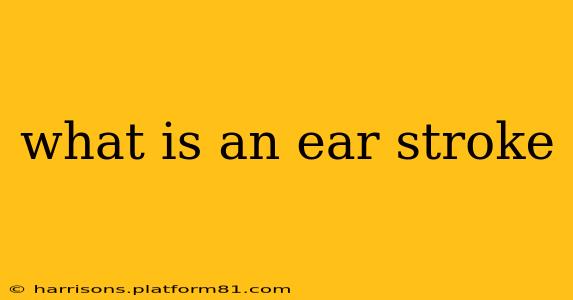The term "ear stroke" isn't a medically recognized term. There's no condition specifically called an "ear stroke." However, the phrase likely refers to a stroke affecting the parts of the brain responsible for hearing and processing sound. This can lead to significant hearing loss or other auditory problems. It's crucial to understand that a stroke impacting hearing is a serious medical event requiring immediate attention. It's more accurately described as a stroke affecting the auditory system.
What causes hearing loss after a stroke?
A stroke occurs when blood flow to part of the brain is interrupted, depriving brain cells of oxygen. If the affected area controls auditory functions, hearing can be impacted. The specific cause of the hearing loss depends on the location and severity of the stroke. Damage can occur in several areas:
- Brainstem: The brainstem is crucial for relaying auditory information from the ears to the brain. A stroke here can cause significant hearing loss, often affecting both ears.
- Auditory Cortex: This area processes sound. Damage here can lead to problems understanding speech (auditory agnosia) or difficulties localizing sounds.
- Cerebellum: While not directly involved in hearing, the cerebellum plays a role in coordinating sensory information. A stroke here can affect balance and coordination, which can indirectly impact how the brain processes auditory signals.
What are the symptoms of a stroke affecting hearing?
Symptoms of a stroke affecting hearing can vary greatly depending on the location and extent of the brain damage. They can include:
- Sudden hearing loss: This can range from mild difficulty hearing to complete deafness in one or both ears.
- Tinnitus: A constant ringing, buzzing, or hissing in the ears.
- Difficulty understanding speech: This is known as auditory agnosia and can make it hard to follow conversations, even if hearing is otherwise normal.
- Problems localizing sounds: Difficulties determining the direction or distance of sounds.
- Hyperacusis: Increased sensitivity to sounds, making even normal sounds seem painfully loud.
- Other stroke symptoms: Remember that stroke symptoms are not limited to hearing. Other common symptoms include sudden weakness or numbness on one side of the body, facial drooping, confusion, difficulty speaking, severe headache, and vision problems.
How is a stroke affecting hearing diagnosed?
Diagnosing a stroke affecting hearing involves a comprehensive neurological examination. Doctors will assess hearing using audiological tests (audiometry) to determine the type and severity of hearing loss. Imaging tests such as CT scans or MRIs will help pinpoint the location and extent of brain damage.
Can hearing loss from a stroke be treated?
Treatment focuses on managing the stroke itself and addressing any resulting hearing problems. Rehabilitation therapies, such as speech therapy, can help improve communication skills. Hearing aids may be beneficial for some individuals with hearing loss. The prognosis depends on the severity of the stroke and the location of the damage. Early intervention is crucial for maximizing recovery.
Is it possible to prevent a stroke that affects hearing?
Preventing strokes is crucial in preventing hearing loss related to them. Lifestyle changes can significantly reduce the risk. These include maintaining a healthy diet, regular exercise, managing blood pressure and cholesterol, not smoking, and limiting alcohol consumption. Regular check-ups with your doctor can also help identify and manage risk factors.
What is the difference between a stroke and an ear infection?
This is a crucial distinction. While both can cause hearing problems, they are entirely different conditions. An ear infection (otitis media) is an infection of the middle ear, typically causing pain, fullness, and reduced hearing in the affected ear. A stroke, on the other hand, is a neurological event affecting the brain, leading to a range of symptoms including potential hearing loss, but often alongside other neurological signs. They require very different treatments.
Remember, if you experience any sudden hearing loss, tinnitus, or other neurological symptoms, seek immediate medical attention. Early diagnosis and treatment are critical in managing stroke and minimizing long-term effects. This information is for general knowledge and does not constitute medical advice. Always consult a healthcare professional for any health concerns.
